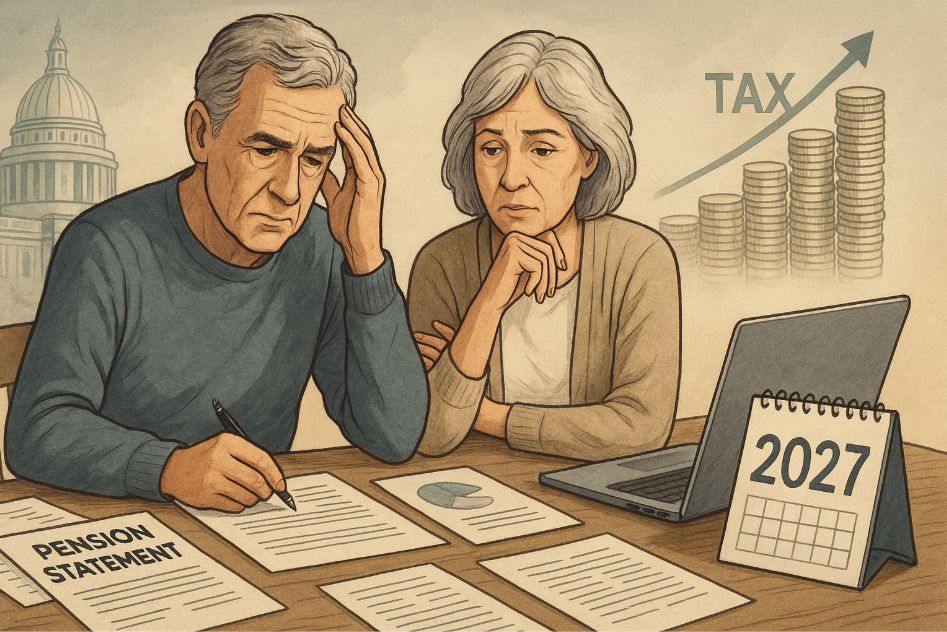In April 2027, the UK government will implement significant changes to how pensions are treated for inheritance tax (IHT) purposes. Previously, unused pension funds often provided a way to pass wealth tax-free to beneficiaries.
However, under the 2024 Autumn Budget reforms, these advantages are being curtailed. From April 6, 2027, many pension funds will be subject to IHT, potentially impacting thousands of estates. This guide explores what these changes mean, who will be affected, and how individuals can prepare.
What Is the 2027 Pension Tax Raid and Why Is It Making Headlines?

The phrase “pension tax raid” refers to the UK government’s decision to include unused pension funds and death benefits within an individual’s estate for IHT calculations. This represents a major policy shift, as pensions were previously excluded from estate valuations.
Announced in the 2024 Autumn Statement, this move aims to close what the government perceives as a tax loophole. where pensions were used as vehicles for tax-free wealth transfer rather than retirement income. As a result, up to 49,000 estates could see increased tax liabilities, and many will be taxed for the first time.
How Will Inheritance Tax Rules Change in 2027?
From April 6, 2027, both Defined Contribution (DC) and Defined Benefit (DB) pension schemes will see unused funds and lump-sum death benefits included in the estate for IHT purposes. The standard inheritance tax rate of 40% will apply to these amounts if the estate exceeds the nil-rate band (£325,000 for individuals, £650,000 for married couples or civil partners).
However, dependants’ scheme pensions typically paid to spouses or children will remain outside the estate for IHT purposes, though they will still be subject to income tax at the recipient’s marginal rate.
Who Will Be Affected by the Pension Lifetime Allowance Changes?
While the pension lifetime allowance (LTA) is being abolished, the government is tightening rules around lump-sum withdrawals and taxation on death. Previously, pensions exceeding the LTA were taxed heavily. Under the new rules, excess savings won’t be penalised under the LTA but may fall under IHT, depending on how and when they are accessed or passed on.
Those who have built significant pension pots and planned to leave them untouched for inheritance purposes are the most vulnerable. Financial experts estimate around 10,500 estates will become liable for IHT for the first time due to these changes.
What Does the Tax Reform Mean for Pension Death Benefits?

The tax treatment of death benefits is one of the most significant aspects of the reform. Currently, if a person dies before age 75, their beneficiaries can typically receive pension death benefits tax-free. From April 2027, these death benefits will:
- Be included in the estate value for IHT
- Be taxed at 40% if the estate exceeds the threshold
- Require coordination between pension scheme administrators and personal representatives
This shift significantly alters the appeal of leaving pensions untouched as a method of passing on wealth.
Are There Any Pension Withdrawal Limits Under the New Rules?
While the abolition of the LTA removes a cap on total pension savings, tax-free withdrawals will remain capped. Individuals will still be allowed to withdraw 25% of their pension pot tax-free, but this is expected to be frozen at current levels rather than increasing with inflation.
This means that as pension pots grow, the percentage of tax-free access effectively decreases, leading to higher tax exposure during retirement.
What Should UK Citizens Know About Estate Planning After 2027?
The changes call for a re-evaluation of estate planning strategies. Relying on pensions as an inheritance tool may no longer be as tax-efficient. Individuals should consider:
- Drawing down pension funds earlier in retirement
- Making lifetime gifts to reduce estate size
- Investing in IHT-efficient financial products
- Updating wills and trusts to reflect the new rules
- Consulting a qualified financial adviser
Estate planning after 2027 must take into account both income needs during retirement and the tax implications for beneficiaries.
What Are Experts Saying About the 2027 Budget and Pension Strategy?

Industry reaction has been mixed. Royal London and Almond Financial have criticised the move, warning it could penalise responsible savers. Legal and tax experts at HWFisher and Brodies LLP emphasise the importance of professional planning, as the new rules create complexity around taxation, especially when dealing with multiple pension schemes.
Meanwhile, the Treasury maintains that this policy ensures “a fairer tax system”, aligning pensions with other forms of inherited wealth.
How Can Individuals Prepare for the 2027 Pension and Inheritance Tax Changes?
To avoid unexpected tax bills, UK pension holders should act now. Key steps include:
- Reviewing pension drawdown strategies to minimise posthumous taxation
- Using gifting allowances (£3,000 per year + other exemptions)
- Considering charitable donations, which can reduce the overall IHT bill
- Speaking with pension providers to understand how funds will be classified
- Coordinating with estate planners to structure assets efficiently
Proactive planning today can prevent excessive taxation in the future.
How Do Current and 2027 Pension Tax Rules Compare?
| Feature | Current Rules | Post-2027 Rules |
| Lifetime Allowance | £1,073,100 (abolished) | Removed, but new tax risks apply |
| Death Benefit Tax | Tax-free if under 75 | Included in estate for IHT |
| Inheritance Tax Threshold | £325,000 | No confirmed change |
| Lump Sum Tax-Free | 25% of pension pot | Remains at current level |
| Beneficiaries’ Tax | Usually nil | Subject to income tax or IHT |
Why Is It Important to Act Early Before the 2027 Pension Tax Raid?

The upcoming changes create both challenges and opportunities. By planning ahead, individuals can:
- Avoid or reduce IHT liabilities
- Ensure loved ones receive the maximum benefit
- Lock in current rules by drawing down or restructuring assets now
- Maintain control over how and when wealth is distributed
Waiting until after April 2027 could significantly limit available options.
How Will Pension Scheme Administrators Handle the New IHT Rules?
Under the 2027 reforms, pension scheme administrators will take on an expanded role. They will be required to:
- Report the value of unused pension funds and death benefits to HMRC
- Calculate any inheritance tax liability
- Coordinate with personal representatives (PRs) of the deceased to ensure payment
This change is designed to streamline compliance and ensure transparency between pension providers and tax authorities. However, it also means that administrators will need more precise record-keeping and data-sharing protocols, and beneficiaries may experience longer delays in receiving death benefits.
Scheme members are encouraged to contact their providers before 2027 to clarify how these processes will be managed and whether additional documentation or authorisations will be required by their estate representatives.
What Are the Long-Term Implications of the 2027 Pension Tax Changes?

The long-term effects of these changes extend beyond tax calculations they reshape how pensions are viewed in the context of retirement and estate planning.
- Shifting strategies from wealth preservation to income optimisation
- Reduced appeal of pensions as a tool for tax-efficient inheritance
- Increased focus on alternative investment structures (e.g., trusts, AIM portfolios)
- Greater demand for professional financial and legal advice
Ultimately, these reforms underscore a broader policy trend: encouraging individuals to use pensions for retirement income, not for transferring wealth. As such, long-term planning must now integrate retirement needs, tax efficiency, and inheritance goals more closely than ever before.
Conclusion
The 2027 pension tax raid marks a dramatic shift in how pensions are treated after death. By including unused pension funds in inheritance tax calculations, the government is closing a long-standing loophole. For individuals with significant pension savings, now is the time to reassess estate planning strategies, consult advisers, and take control of future tax liabilities. The earlier the planning begins, the more options there will be to preserve wealth and protect loved ones.
FAQs About the 2027 Pension Tax Changes
Will pensions always be taxed at 40% under the new rules?
Not always. Only the amount of unused pension funds that push an estate above the IHT threshold will be taxed at 40%. Some estates may still fall below the nil-rate band.
Can I still pass my pension to my spouse tax-free?
Spouse pensions and dependants’ scheme pensions remain outside of IHT, but the income they receive will be taxed as income.
Is there a way to avoid pension IHT after 2027?
Yes, through early drawdowns, gifting strategies, and proper estate planning. Consulting a financial adviser is essential.
Will income tax on inherited pensions change too?
Income tax treatment will remain unchanged: beneficiaries will pay tax at their marginal rate on income derived from inherited pensions.
Are ISAs affected by these changes too?
No, ISAs are not directly affected by the 2027 pension tax changes, though they are subject to other IHT considerations.
What happens if I have multiple pensions?
Each pension provider will report to HMRC, and the combined value will determine IHT liability. Coordination is critical.
Will these changes affect defined benefit pensions?
Yes, unused defined benefit funds may also be included in the estate and be subject to IHT unless paid as a dependant’s pension.









Leave feedback about this